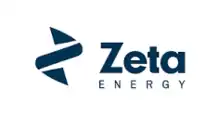 | |
| Type | Private Company |
|---|---|
| Industry | Electric batteries |
| Founded | 2014 at Rice University |
| Founders |
|
| Headquarters | Houston, Texas, U.S. |
Key people | Tom Pilette (CEO) |
Number of employees | 32 (2023) |
| Website | zetaenergy.com |
Zeta Energy is a Houston, Texas-based company that develops lithium-sulfur batteries based on two proprietary technologies: a sulfurized carbon cathode and a 3D-structured metallic lithium anode. This combination yields a battery with high energy density and lower cost than traditional lithium-ion batteries, while also offering comparable cyclability and better safety.[1] The elimination of metals like cobalt, manganese and nickel also dramatically simplifies the supply chain for battery manufacturing.[2]
History
Zeta Energy was founded in 2014 by Charles Maslin, an entrepreneur and investor with an avid interest in technology. Maslin funded and licensed research on lithium-metal batteries being conducted at by a group led by world-renowned chemist and nanotechnologist Dr. James Tour at Rice University.[3]
Technology
The potential for a Lithium-sulfur battery had long been of interest in the scientific community because sulfur is cheap and abundant and offers a theoretical energy capacity that is up to 500 percent higher than conventional lithium-ion battery materials. However, several challenges had limited their development. First, sulfur cathodes suffered from a polysulfide shuttle effect that resulted in “leakage” of active material, leading to degradation of the battery.[4] Sulfur also expanded as it took on lithium ions, creating instability in the battery's structure. As a result of these effects, lithium sulfur batteries had a history of poor “cyclability,” meaning that they could not be recharged very many times, making them commercially nonviable for most applications.[5]
After considerable experimentation, the Zeta Energy team created a novel method of polymerizing sulfur that solved these problems. Zeta's sulfurized cathode contains no elemental sulfur and yields no polysulfides. As Chief Science Officer Rodrigo Salvatierra notes, “Sulfur cathodes have existed since the 1960s, but they didn’t perform well in applications that require many recharging cycles. We designed a special class of sulfurized carbon that enables us to use a high quantity of sulfur, is polysulfide free, and works across a broad range of electrolytes.” [6]
The combination of a dendrite-free, high-density anode, and a sulfur cathode with excellent “cyclability” was termed “The Holy Grail in battery technology" by Forbes Magazine,[7] and attracted considerable attention in the automotive industry as a technology that could significantly improve electric vehicles.[8] Sandy Munro, who gained fame as a tear-down analyst of electric vehicles featured the technology on his "Munro Live" show,[9] and the segment rapidly accrued hundreds of thousands of views and comments. Notably, Zeta's Lithium-sulfur battery also does not use cobalt, nickel or manganese, greatly simplifying the supply chain for batteries,[10] reducing cost and volatility of materials, and avoiding the ethical issues associated with cobalt (cobalt is primarily mined in the Democratic Republic of Congo, a country that is notorious for using child labor in cobalt mines).[11]
Awards
Zeta Energy's achievements earned it a spot on the World Materials Forum's “Top Ten Technologies” list in 2021, the “Coup de Couer Scale-Up Award” from World Materials Forum in 2022,[12] and $4 million in funding from the United States Department of Energy ARPA-E's EVs4ALL program in 2023.[13][14][15]
References
- ↑ Hill, Charles WL; Schilling, Melissa A (2024). Strategic Management:Theory and Cases (14th ed.). Boston, Massachusetts: Cengage. pp. C4.1-C4.4. ISBN 9780357716724.
- ↑ Schilling, Melissa (June 9, 2023). "Innovating a Better, Cleaner and Cheaper Battery". Energies Magazine (Summer).
- ↑ Schilling, Melissa (June 9, 2023). "Innovating a Better, Cleaner and Cheaper Battery". Energies Magazine (Summer).
- ↑ Critchley, Liam. "Why lithium-sulfur batteries are taking so long to be used commercially". Retrieved June 28, 2023.
- ↑ Zhu, Kunlei (2019). "How far away are lithium-sulfur batteries from commercialization?". Frontiers in Energy Research. 7. doi:10.3389/fenrg.2019.00123.
- ↑ Schilling, Melissa (June 9, 2023). "Innovating a Better, Cleaner and Cheaper Battery". Energies Magazine (Summer).
- ↑ Rapier, Robert. "The Holy Grail of Lithium Batteries". Forbes. Retrieved August 9, 2019.
- ↑ "CleanTech Talk: Lithium-sulfur battery breakthrough from Zeta Energy?". CleanTechnica. July 14, 2023.
- ↑ Munro, Sandy. "Zeta Energy: A Battery Breakthrough?". Youtube.com. Munro Live. Retrieved March 10, 2023.
- ↑ Walford, Lynn. "Sustainable, High-Performance, Cheaper and Safer - Zeta Energy's Lithium-Sulfur Batteries". Auto Futures. Retrieved July 30, 2023.
- ↑ Sanderson, Henry (7 July 2019). "Congo, child labour and your electric car". Financial Times. Retrieved July 28, 2023.
- ↑ "022 WMF Start Up & Scale Up Challenges: Prof. Victoire de Margerie announces the Awards". World Materials Forum. Retrieved August 2, 2023.
- ↑ "Zeta Energy: Enabling Fast Charging Batteries with 3D Lithium Metal Architectures and Sulfurized Carbon Cathodes". ARPA-E. US Department of Energy ARPA-E. Retrieved November 16, 2023.
- ↑ Moreno, Mayra (11 January 2023). "Houston startup company gets $4 million for electric vehicle battery technology". ABC13 Eyewitness News. Retrieved November 16, 2023.
- ↑ Nair, Jishnu (January 12, 2023). "Houston battery producer Zeta Energy named recipient of Department of Energy grant". The Business Journals. Retrieved November 16, 2023.